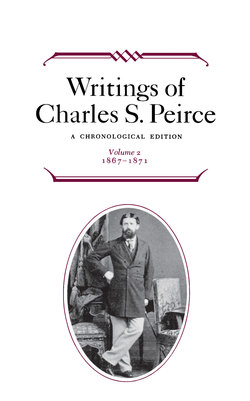Читать книгу Writings of Charles S. Peirce: A Chronological Edition, Volume 2 - Charles S. Peirce - Страница 21
На сайте Литреса книга снята с продажи.
ОглавлениеChapter I. One, Two, and Three
MS 144: Summer-Fall 1867
Logic must begin with analyzing the meanings of certain words, which we shall take up in due order.
The first of these is the word ‘is’, as when we say, Julius Caesar is dead, a griffin is a fabulous animal, a four-sided triangle is an absurdity, height is the distance from the ground, nothing is that which does not exist. These examples suffice to show that we apply this word to whatever we give a name, whether it really exists or not, or whether we consider it as existing or not.
The word is is called by logicians the copula because it joins subject and predicate. That which is, in the sense of the copula, was termed ens (pl: entia) by the schoolmen, and the corresponding abstract noun used was entitas. In this as in many other cases, we have taken in English, the abstract noun in a concrete sense, and we can consequently speak of entities. At the same time we have forgotten the very general meaning attached to the word in the middle ages, as denoting whatever can be named, and employ it for what would then have been termed ens reale. Thus, we often hear the schoolmen reviled because they considered abstractions to be “entities,” but in their sense of the term it admits of no dispute that an abstraction is ens. It is true that they frequently use the word ens simply when they mean ens reale, but only in cases in which there can be no doubt of their meaning; and it was universal to consider entia as embracing not only entia realia but also entia rationis. I propose to restore the term ens or entity to its original meaning of whatever can be named or talked about. I shall also endeavor as much as possible to reserve the word being and other derivatives of is, to express this same conception; but these words must be somewhat ambiguous.
It may be observed that entity is so extremely general a name that it has no negative over against it. We may talk of a nonentity, but then as we have given it a name it is also an entity.
In contrast with this general being which is conferred by our mere thought of an object, is the being of real things which is quite independent of what we think.
We shall designate this by ‘reality’, and its cognates; and shall employ ‘figment’ and ‘fiction’ to denote that which is non-existent without meaning to imply that the conception has been a deliberate invention.
It is important to observe that the essential difference between a reality and a nonreality, is that the former has an existence entirely independent of what you or I or any number of men may think about it. What I dream, for example, only exists so far as my dreaming imagination creates it. But the fact that I have had such a dream, remains true whether I ever reflect upon that fact or not. The dream, therefore, as a mental phenomenon, is a reality; but the thing dreamed is a figment. If there ever really was such a man as Romulus, he would have existed just the same if history had never mentioned him; but if he is not a reality he exists only in the fables which have been told of the foundation of Rome. When Gray says,
Full many a gem of purest ray serene
The dark unfathomed caves of ocean bear;
Full many a flower is born to blush unseen
And waste its sweetness on the desert air;
he expresses with precision the essential character of reality. But when we say that the real is that which is independent of how you or I or any number of men think about it, we have still left the conception of independent being to be analyzed. Before making that analysis we must consider the conceptions of one, two, and three.
We have seen that an ens is something to which the copula is can be applied. But is is a word whose meaning is not complete in itself. It means nothing to say that anything is (in the sense of the copula) unless I say what it is; for the only function of the copula is to join subject and predicate. Hence, whatever is, is somehow. This somehow of entity I propose to express by the term quality. A quality therefore in the very general sense in which I shall use it, denotes whatever can be expressed by all that comes after is in a complete assertion. Every ens, then, has some quality for to say that it is an ens is to say that it may be made the subject of an assertion and that assertion must have some predicate. There is no conception so vague that some thing cannot be asserted of the object of it, for it is the first condition of thought that some quality must be thought in the thought.
